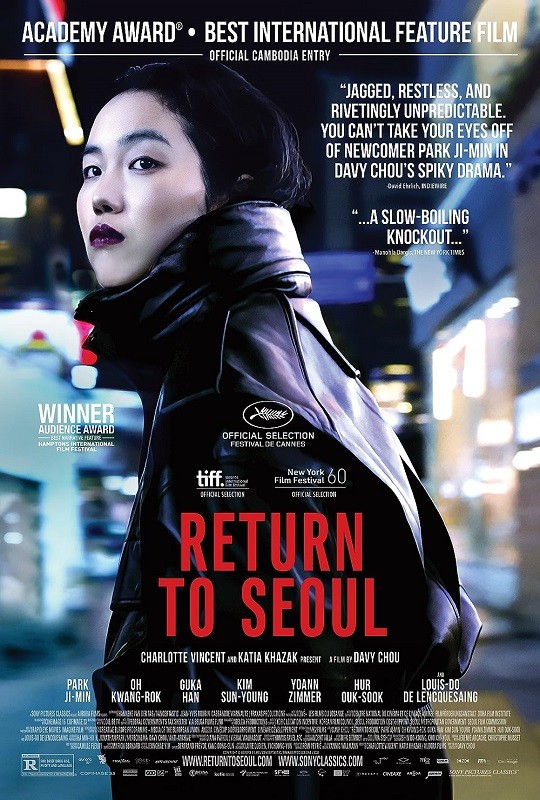Return To Seoul
Introduction
It is still a Tuesday but this week presents me with another little opportunity to take a peek at my watchlist. With that, I decided to watch and review the new Korean film Return To Seoul which is now streaming on Mubi. And I am quite late to the party given that this film had previously premiered at the Cannes Film Festival last year and was Cambodia’s Official Selection to the Academy Awards this year(held in March 2023). When the film does have such merits to its credit, naturally the expectations are sky high. And like always, I knew absolutely nothing about the film and what story it had to tell. So then does Return To Seoul manage to impress, lets find out.
Story & Screenplay(Movie & Ending Explained)
Return To Seoul follows the story of a young woman returning to Seoul in order to search for her biological parents. Will she find answers to her existence? The story here might seem simple but it is so layered and nuanced that it did take me a while to process the conflicting emotions in play. Moreover, the story presented with a fascinating character study of a very complex individual who is often representative of us undergoing an existential crisis. The only difference between that this story has an underlying layer of emotions which aren’t differentiating into one particular colour. What this does is that it forces the viewers to feel the conflicting emotions of the protagonist. The screenplay standing at a shade under 2 hours is niche but does make for a gut-wrenching watch resulting out of an aching exploration of multiple emotions in play. This section will contain spoilers.
The drama does open with the introduction of the protagonist in a very vague manner. You aren’t provided with any glimpse of the emotional baggage of the protagonist early on, wherein she befriends an acquaintance while also sleeping with a stranger all in one night at an unknown place. Amidst the few conversations, you get to know about her nationality while she completely brushes aside the idea of searching for her biological parents. Her outer demeanor is of a care-free spirit while her inner most vulnerability prompts her to reverse her decision of searching for her parents. Also, contrary to what is told to the viewer, her trip to Seoul wasn’t merely an ‘accident’ and that can be attributed to the fact of her undergoing an existential crisis perhaps following her discovery on being adopted and eventually growing up in France.
Home is often a place which is comforting and always welcoming. But one glimpse into the psyche of the protagonist and you get to know of her confusion on the concept of ‘Home’. Is it the place where she grew up, or is it the place where she was born? The concept is ambiguous and often reflective of her choices in the film. The writers do well in not restricting the drama only in Seoul while traversing their gaze to the countryside wherein the protagonist soon discovers her biological father, now an alcoholic and willing to keep in touch with her. Almost instantly, she takes a disliking to him as he may no longer fit in her depiction of a father. This is when her narcissistic ego kicks in, almost disallowing her conscious and turning her actions into rage. This, while she continues to remain oblivious to the concept of love as well probably a gap created out of her fallout with her father. While she doesn’t give importance to the stranger whom she had slept with, brushing his feelings aside, she also is abandoned by her acquaintance Tena citing her as a ‘sad person’.
The drama unfolds over a period of 8 years with the first jump in time taking place 2 years from her first entry in Seoul. There is a sense of longing that she is subjected to, which is why she lands herself a job in Seoul(despite previously admittedly saying to her father that she belongs to France on his insistence of wanting her to stay with him). There is a sense of incompleteness given that she hasn’t yet got in touch with hef biological mother that has resulted in her being lonely and a tad desperate. Things further escalate after she works for an arms dealer who coins her a term, ‘Trojan Horse’ that accentuates her ambiguity with respect to her home.
During this period, her narcissistic ego has further developed despite her being matured over time. A case in point being that she can’t digest the fact that her father has now given up on alcohol and instead also composed a tune for her. This piles up into rage that is aimed at her then boyfriend who has to bear the brunt for the same. Yet, that desperation of wanting to find her mother does eventually pay off(after another jump in time) in a searing scene that made my heart melt. The two characters console each other(while her mother provides her with an email address for them to keep in touch) with their moment reduced to being short lived.
This brings me to the bittersweet final act that is titled more towards a heartbreak while adding a streak of hope. One year after their meetup, the protagonist, while continuing to fuel her inner freedom decides to send her mother an email for the first time. The email remains undelivered which brings her to the same position that she hsd previously found herself in at the start of the film. She doesn’t have a way to get in touch with her mother and that is such a heartbreaking emotion. Yet, the symphony that she plays on the piano depicts a sense of healing while days of uncertainty lie ahead of her. It was poetic, pragmatic and a melancholic tale of metamorphosis that made me think about the protagonist long after the film had ended. It was searingly beautiful and bittersweet in a masterfully penned screenplay.
Dialogues, Music & Direction
The dialogues are conversational and fully relying on the viewers to try and dig beneath the surface. The more you delve in it, the more rewards are to be had. The music and the BGM are painfully beautifully, often cutting through the emotions with a wonderful symphony. Every time there is a buildup of emotions, a little synphony kicks in to pave the way ahead in the narrative. The cinematography is wonderful, often taking the viewing on the journey of the protagonist, represented by some wonderful frames and colours. The dark and neon pink hues of the city are cut by shades of yellow of the countryside that is reflective of the confused mindset of the protagonist. The editing is crisp and sharp. Director Davy Chou does a wonderful job in handling a sensitive subject with the most pragmatic kind of emotions which are conflicting just like in reality. The idea was not to allow the viewers to sit on a fixed set of emotions for too long and he does a wonderful job here. The direction is excellent.
Performances
The performances are excellent here. Guka Han as Tena, Yoann Zimmer as Maxime and Oh Gwang-rok as the Father have their moments to shine. But the show belongs to Park Ji-min who is phenomenal as Freddie. This was such a challenging character to portray given that there were multiple and challenging emotions in play and she does such a brilliant job. It was a towering act in a brilliant performance which ended up being a fascinating character study.
Conclusion
Return To Seoul is an aching exploration of the concept of Home and the scarred metamorphosis of a conflicting character that makes for a fascinating character study, in what ended being a brilliant watch! Available on Mubi and Highly Recommended!




